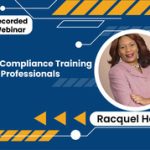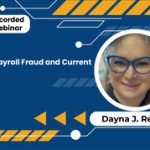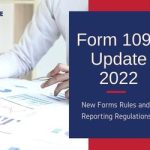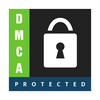RECORDED TRAINING COURSE
Let’s face it… complying with the Internal Revenue Tax Code requirements and federal regulations for fringe benefits such as relocation, meals, lodging, educational assistance, health insurance, transportation, and third-party sick pay can be complicated. The taxation and reporting for these fringe benefits offered by many companies today are major components of a payroll department’s responsibilities. And with the IRS looking for consistency of treatment—you can’t afford to make a mistake.
As a payroll professional, you must know cold—no guessing—when a fringe benefit is taxable and when it is not when it is reportable and when it is not. Payroll must know when providing a fringe benefit must be considered wages or if it is “tax-free”. What if the employee pays some of the cost of a fringe benefit? How does that affect taxing and reporting? Are there dollar limits? Does it become taxable after a certain amount? And after you have mastered all the facts along comes a new tax bill by Congress that can change everything you just learned when it comes to taxing fringe benefits.
All fringe benefits must be handled correctly, under the latest rules, to minimize the chance for penalties and interest to be levied against your company or for triggering larger and more intrusive governmental audits.
SESSION HIGHLIGHTS:
- Transportation Fringe Benefits
- What are the four allowable methods to calculate the personal use of a company car
- How to calculate the taxable wages for the personal use of a company vehicle using one of the four accepted IRS methods
- When an auto allowance is considered taxable wages and when it is not
- IRS 132 transportation fringe benefits including parking, bus passes and tokens and bicycles—when to tax and when not too
- Calculating the personal use of a company aircraft even if there is a business trip involved somewhere
- Section 132 Fringe Benefits
- Working Condition Fringe Benefits
- De Minimis Fringe Benefits
- Employee Discounts
- No additional cost services
- Employee Achievement Awards for Length of Service and Safety-the changes under the new tax bill
- Prizes and Awards—Cash and Noncash
- Cell phones
- Gift certificates and gift cards
- Holiday gifts
- Meals, Clothing, Housing and Education Fringe Benefits
- The changes to employer provided relocation under the Tax Cuts and Jobs Act of 2017
- On-site lodging taxation and reporting
- Taxing lodging for executives such as vacation condos
- Providing meals for employees—is it taxable or not?
- Are the rules different for on-site cafeterias
- What if the employee pays for the meal—does that affect taxation
- What to do with occasional meals
- Educational assistance programs and taxation
Who Should Attend:
- Payroll Executives/ Managers/ Administrators/ Professionals/ Practitioners/ Entry Level Personnel
- Human Resources Executives/ Managers/ Administrators
- Accounting Personnel
- Business Owners/ Executive Officers/ Operations and Departmental Managers
- Lawmakers
- Attorneys/ Legal Professionals
- Any individual or entity that must deal with the complexities and requirements of Payroll compliance issues
Note: You will get access to the Recording link and E-Transcript; in your account and at your registered email address.
 Vicki M. Lambert, CPP, is President and Academic Director of The Payroll Advisor™, a firm specializing in payroll education and training. The company’s website www.thepayrolladvisor.com offers a payroll news service which keeps payroll professionals up-to-date on the latest rules and regulations.
Vicki M. Lambert, CPP, is President and Academic Director of The Payroll Advisor™, a firm specializing in payroll education and training. The company’s website www.thepayrolladvisor.com offers a payroll news service which keeps payroll professionals up-to-date on the latest rules and regulations.









